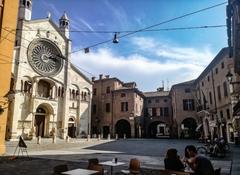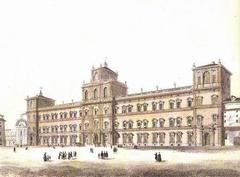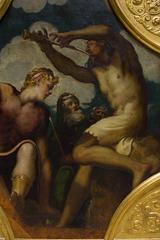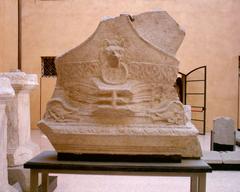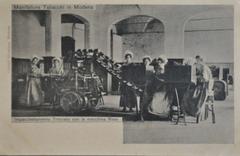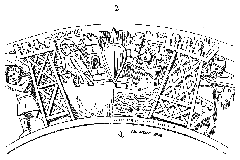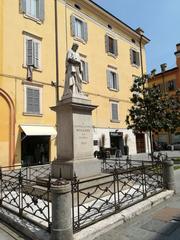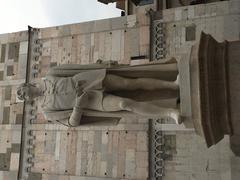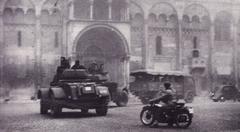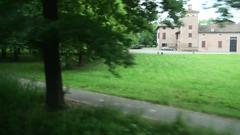Torrazzo di Baggiovara: Visiting Hours, Tickets, and Modena Historical Sites Guide
Date: 14/06/2025
Introduction
Located in the tranquil rural district of Baggiovara, southwest of Modena, Italy, the Torrazzo di Baggiovara stands as a significant yet often overlooked historical landmark. While Modena is celebrated for its Romanesque Cathedral and the Ghirlandina Tower, the Torrazzo provides a rare glimpse into the region’s medieval rural life and architectural evolution. This guide brings you all the essential information needed for your visit, including the history of the Torrazzo, practical details on visiting hours and tickets, accessibility tips, and suggestions for exploring related Modena historical sites. Whether you’re a history enthusiast or a curious traveler, this article is designed to enrich your cultural journey through Emilia-Romagna (Catalogo Generale dei Beni Culturali; Adventure Backpack: Modena Culture; AOU Modena).
Table of Contents
- Historical Origins and Development
- Architectural Highlights
- Cultural Significance
- Location and Accessibility
- Visiting Hours and Tickets
- Tips for an Enriching Visit
- Practical Considerations
- Frequently Asked Questions (FAQ)
- Preservation and Future Initiatives
- Exploring More Modena Historical Sites
- Conclusion
- Sources and Further Reading
Historical Origins and Development
The Torrazzo di Baggiovara traces its origins to the late Middle Ages or early Renaissance (14th–15th centuries). It was likely built as a defensive and symbolic structure for local nobility, overseeing the fertile Modenese plains. The term “torrazzo” refers to a large, often freestanding tower, common in the rural landscapes of Emilia-Romagna during periods marked by feudal consolidation and increasing need for local surveillance and authority.
Baggiovara’s strategic location, near routes connecting Modena to the Apennines, made it ideal for such a structure. Over the centuries, the Torrazzo evolved from a watchtower and status symbol into an enduring emblem of the area’s rural heritage (Catalogo Generale dei Beni Culturali).
Architectural Highlights
Constructed primarily from locally sourced brick and stone, the Torrazzo features a square base and rises vertically with little external ornamentation, reflecting its original defensive function. Thick walls provide insulation and protection, while narrow windows allowed for observation without sacrificing security. Internal staircases accessed the upper levels, which offered panoramic views of the countryside.
The tower is notable for its preservation of medieval construction techniques typical of the Po Valley. Some elements, such as roofing or masonry, may have been restored over time, but the essential structure remains intact. The Torrazzo complements Modena’s urban monuments, like the Cathedral and Ghirlandina Tower, by showcasing the region’s rural architectural legacy (Adventure Backpack: Modena Culture).
Cultural Significance
Historically, the Torrazzo served as both a defensive outpost and a symbol of feudal authority. As threats waned, it became a local landmark and gathering point for community events. Today, it is valued as a tangible link to Baggiovara’s past, often featured in heritage walks, festivals, and educational programs. Its presence fosters a sense of identity and continuity among residents, embodying the resilience of Modena’s rural traditions (Adventure Backpack: Modena Culture).
Location and Accessibility
The Torrazzo is situated about 8 kilometers southwest of Modena’s historic center in Baggiovara. It is accessible by car, bicycle, or public transportation, with local bus lines connecting Baggiovara to Modena. The tower is a short walk from nearby parking, but due to its historic nature, interior wheelchair access is not available; the exterior grounds are generally accessible (AOU Modena).
Visiting Hours and Tickets
As of June 2025, the Torrazzo di Baggiovara is primarily an external monument. The grounds around the tower are open for viewing at all times, without admission fees. Interior access is limited due to preservation concerns but may be possible during special events or guided tours; such occasions typically require advance booking or a small fee via local tourism offices. Always check the latest information on official sites before your visit (Catalogo Generale dei Beni Culturali).
Tips for an Enriching Visit
- Combine Destinations: Pair your visit with other Modena historical sites like the Cathedral, Ghirlandina Tower, or Enzo Ferrari Museum.
- Check Local Events: Plan your trip around festivals such as the Festa della Rossa or seasonal food events for a vibrant cultural experience (Adventure Backpack: Modena Culture).
- Photography: The rural landscape and rustic tower offer excellent photo opportunities, especially at sunrise or sunset.
- Respect Conservation: Adhere to posted guidelines and avoid climbing or entering restricted areas to help preserve the site.
- Cultural Engagement: Explore nearby artisan workshops or local trattorias to experience Modena’s renowned cuisine and crafts.
Practical Considerations
- Best Seasons: Spring and autumn offer mild weather and picturesque scenery.
- Facilities: There are limited on-site amenities; bring water and snacks, especially if visiting outside of event days.
- Guided Tours: Inquire with local tourism offices for scheduled tours or educational programs.
Frequently Asked Questions (FAQ)
Q: Is there an admission fee?
A: No, viewing the Torrazzo’s exterior is free. Special events may require tickets.
Q: Can I enter the tower?
A: Regular interior access is unavailable, except during select guided tours or events.
Q: Are guided tours offered?
A: Yes, occasionally during festivals or heritage days. Check schedules in advance.
Q: How do I get there?
A: Reachable by car, bus, or bicycle from Modena city center.
Q: Is the site accessible for wheelchairs?
A: The exterior is accessible, but interior access is limited due to historic preservation.
Preservation and Future Initiatives
Recognized as a site of historical and architectural importance by Italian cultural authorities, the Torrazzo benefits from ongoing preservation efforts focused on maintaining its structural integrity and community relevance. Local initiatives and heritage programs aim to increase public awareness and participation in conserving Modena’s rural past (Catalogo Generale dei Beni Culturali).
Exploring More Modena Historical Sites
Enhance your cultural itinerary with these nearby attractions:
- Modena Cathedral (Duomo di Modena)
- Ghirlandina Tower
- Enzo Ferrari Museum
- Castello di Formigine
- Villa Fabriani Museum of Traditional Balsamic Vinegar
For further historical context, consider pairing your visit with sites such as the Terramara di Montale Archaeological Park, which explores the region’s Bronze Age heritage (ScienceDirect).
Conclusion
The Torrazzo di Baggiovara provides a captivating look into Modena’s rural and medieval history, standing as a testament to the region’s enduring architectural and cultural legacy. Its rustic charm, community significance, and scenic setting make it a valuable addition to any Modena itinerary. By respecting preservation guidelines and engaging with local culture, you contribute to the continued safeguarding of this unique heritage site.
For the latest updates on visiting hours, tickets, and special events, consult official tourism resources. Enhance your journey by downloading the Audiala app for guided audio tours and following local cultural channels for insider tips.
Sources and Further Reading
- Catalogo Generale dei Beni Culturali
- Adventure Backpack: Modena Culture
- AOU Modena
- UNESCO – Modena Cathedral
- Wonderful Wanderings – Things to do in Modena
- The Travel Folk – One Day in Modena
- ScienceDirect – Terramare Civilization
